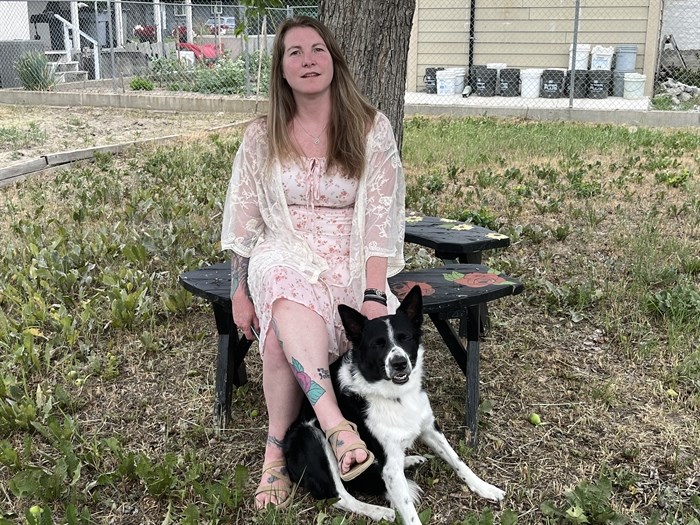Recovering Kamloops addict hit rock bottom and fought back for a new life

Kamloops resident Cindy Dixon, 46, wears a summery dress and sips on cool water while she sits at a backyard patio table in the sun, her daughter’s dog pestering her to throw his ball. With a smile she removes her sandals and pushes her tattooed feet into the grass, settling back in her chair.
At one point in her life, Dixon was eating out of garbage cans and shooting up drugs, sleeping in trash bins or tents on the streets of Kamloops.
“Sometimes I still can’t believe I’m here, I’ve gone from being a hopeless junkie to a clean and sober spirit,” she said.
Now approaching 20 years in recovery, Dixon is a survivor of trauma, years of severe alcohol and drug addiction, homelessness and a long hard fight to get sober and get her children back. In the midst of an overdose crisis that shows no sign of abating, she is sharing her story. There is hope, she says, but hers only came after “hitting her rock bottom."
“There is help out there, you gotta get to a point where enough is enough,” she said.
Dixon’s addictions began when she was young, growing up in Vancouver. She said she was living in a dysfunctional family and started drinking alcohol at age six.
“My mom and dad weren’t parents, I raised them,” she said. “Mom was mentally ill from her own trauma, we were in a vicious cycle of abuse and violence. My dad was a raging alcoholic and was mean. He’d do cocaine, he’d beat up my mom and was a sexual abuser. Every time that drink numbed me so I didn’t have to feel that shame, it was my first medicine.”
Dixon said as a teenager she used marijuana and crystal meth in secret for years. She left home at age 16 and dropped out of school.
She moved to Kamloops at age twenty, pregnant with her second child and after the birth she continued using alcohol and doing drugs. Social services kept checking up on the home and the children were removed from her care on a few occasions. She said even that wasn’t enough to make her stop using.
“When my kids got removed the second time I met a man who was into crack cocaine,” she said. “My kids came home and we were doing drugs and within a week I was hooked. I was doing crack and doing it a lot. I was spending money on it and hitting the food bank, just a vicious cycle.”
A relative called social services and the children were removed again for the last time.
“Losing my kids didn’t make me hit bottom, I kept going because they took my kids so I’m using and drugging and numbing at that,” she said.
Dixon ended up living on the streets of Kamloops for the next year, sometimes in a tent, addicted to crystal meth. She was so needle dependent she was shooting up water when she didn’t have drugs and was eating out of garbage bins.
“It was an addiction to the needle,” she said. “I’d already overdosed twice and was angry when they’d bring me back because all that pain I was carrying came back. I didn’t even realize at the time I had two beautiful girls.”
Dixon found herself sitting in an apartment building on Tranquille Road with drug dealers and prostitutes making counterfeit money. She looked around and realized she didn’t want to be a part of the lifestyle anymore and had what she called “a spiritual awakening.”
“I realized the danger, how deep in I was, people were shooting up everywhere, my kids had been gone for a year and I realized all at once just how messed up it all was,” she said. “It was an 'aha' moment. I made a decision.”
Dixon said she remembers sitting outside a barbershop thinking about her life for a while before walking to her mom’s house nearby, underweight, dehydrated and exhausted.
“It was so hard to make it down the hallway I was so sick and when my mom saw me she broke down and cried,” she said. “Both my arms were covered with abscesses, I hadn’t had food or water for days. I probably would've died if I didn't stop using."
READ MORE: Interior Health asks local governments to pause plans to ban open drug use in parks
Up to this point, Dixon had been in detox several times and overdosed twice. She’d attempted treatment but relapsed because she “wasn’t ready.” This time she was. She went to detox for the last time. She entered recovery programs and followed through with them, and got a sponsor. At first she needed medications and was mentally unstable.
As part of the program she ended up living in a house for women in recovery and began building a personal foundation and friendships. She worked through the process of dealing with trauma and underlying issues. Meanwhile she was in and out of court, fighting to get back custody of her children, and eventually, she did.
Today, looking around at the homeless and drug addicted people on the streets of Kamloops, Dixon understands exactly what they’re going through.
“These are lost souls and I get it, it’s from mental health and trauma,” she said. “It’s generational trauma and they’re carrying all that shame around and it’s not even their shit. You grow up in a dysfunctional home, you learn coping skills, not actual skills to deal with life.”
READ MORE: Kelowna study looks behind closed doors of new supportive housing
There is no way around it, Dixon said, drug addicts have to want to change their lives. She doesn’t agree with how the drug crisis is being managed.
“If drugs are easily accessible how do they hit that bottom?” she said. “Now there are places to get drugs and safe injection sites, homes are provided to them in contained areas, this is keeping them sick.”
Dixon said there are no consequences for addicts when they break things and steal to support their habits, which is not helping them recover.
“Society is seeing that and that’s why it’s so looked down upon,” she said. “I get it, I was that person, I didn’t give a fuck because it was all about me and I was living in a psychosis world. There’s no reality for them, you can talk all you want but they don’t hear it. It’s the reality of addiction. How can they hit a bottom when they get so much help with no consequences, that’s where I see things going wrong.”
READ MORE: A Kamloops man's long fight from crack addiction to sobriety and new beginnings
Today Dixon helps others wherever she can, handing out food and water to those who want recovery and those who don’t.
Her recovery is daily and and she attends recovery meetings regularly. She’s had to learn to love and forgive herself in order to be productive and maintain her sobriety.
“It’s hard work but lately I’m seeing how far I’ve come, it’s a beautiful journey,” she said. “I got my children back, I found a higher power. I can see blessings in my life and am living in gratitude.”
To contact a reporter for this story, email Shannon Ainslie or call 250-819-6089 or email the editor. You can also submit photos, videos or news tips to the newsroom and be entered to win a monthly prize draw.
We welcome your comments and opinions on our stories but play nice. We won't censor or delete comments unless they contain off-topic statements or links, unnecessary vulgarity, false facts, spam or obviously fake profiles. If you have any concerns about what you see in comments, email the editor in the link above. SUBSCRIBE to our awesome newsletter here.



